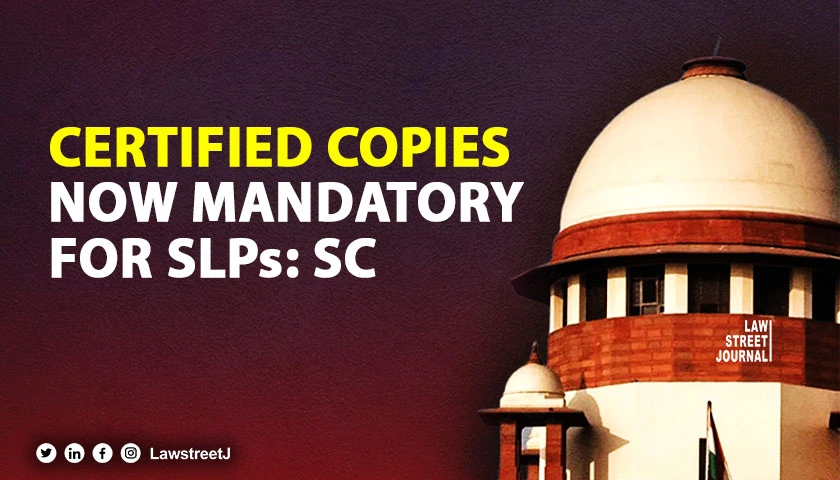NEW DELHI: The Supreme Court has deprecated the practice of filing a special leave petition without a certified copy of the High Court's order or filing of such pleas with a downloaded copy of the impugned order, contrary to the rules.
A bench of Justices Dipankar Datta and Prashant Kumar Mishra made it mandatory from August 20, 2024 for all the litigants who proposed to file special leave petitions on civil and criminal side without the certified copy of the High Court's judgment or order, to give an acknowledgement that they had applied for such copies and make an undertaking to place such judgment on record in future.
"We are pained to note that despite there being specific provisions in the 2013 Supreme Court Rules requiring a special leave petition to be accompanied by the certified copy of the impugned judgment and order, such provisions are observed more in the breach. Such a situation should not to be allowed to persist; so long the rules exist, there has to be substantial compliance," the bench said.
The court said even if the certified copy is not available on the date of presentation of a special leave petition, proof of application for such copy has to be adduced for the court to consider the prayer for exemption.
"It has been our joint experience on the bench of this court (howsoever short it is) that in the vast majority of matters arising from the high courts and placed before us for decision, the special leave petitions are accompanied by applications seeking exemption from filing certified copies of the judgments and orders impugned in such petitions," the bench said.
Also Read: Sikkim High Court Announces Menstrual Leave for Female Employees [Read Order]
The bench said invariably, the court accepts the statements made in such applications believing what have been stated as correct.
However, the bench said,
"This mild approach of the court has generated a sense of belief among litigants that they can get away scot-free even by making statements which are far from the truth. It is high time that some sense of discipline is instilled so that the court is not taken for a ride."
The court pointed out in criminal matters, Rule 3 of Order XXII of the Supreme Court Rules, 2013 ordained that the petitions shall be accompanied by a certified copy of the judgment or order appealed from. Similar provision is found in Rule 4 of Order XXI of the 2013 Rules for special leave petitions pertaining to civil matters.
The bench also noted litigants, finding that the court is lenient in such matters, seldom apply for and obtain such copy; more often than not, it is the downloaded copy of the impugned judgment and order which is annexed to the special leave petition.
The court issued its directions while considering a special leave petition against the Calcutta High Court's order.
In the case, the bench said this special leave petition dated 25th June, 2024 was presented on July 11, 2024. Since the special leave petition was barred by time by 774 days, the petitioners applied for condonation of delay.
Also Read: Denying child care leave to working mothers of disabled children violated constitutional mandate: SC
The petitioners also applied for exemption from filing the certified copy of the impugned order.
"Perusal of the said application does not reveal that an application for certified copy of the impugned order had been made any time prior to presentation of the special leave petition. In fact, the first time such an application was made is on 29th July, 2024. Obviously, it is a post-order incident," the bench said.
Senior advocate Siddharth Bhatnagar, appearing for the petitioners, in his fairness, submitted that the petitioners made an absolutely incorrect, nay false, statement that the High Court had not furnished the certified copy of the impugned order despite they having applied for the same.
"We would have been entirely justified in directing the Registry to take suitable steps for initiation of proceedings before the criminal court against the petitioners but having regard to the fervent prayer made by Bhatnagar that the petitioners may not entirely be at fault, we refrain from so directing," the bench said.
"However, having regard to the skullduggery that was sought to be adopted, we see no reason to condone the grave lapse on the part of the petitioners and hear them on the merits of the special leave petition," the bench said, dismissing the petition.

















